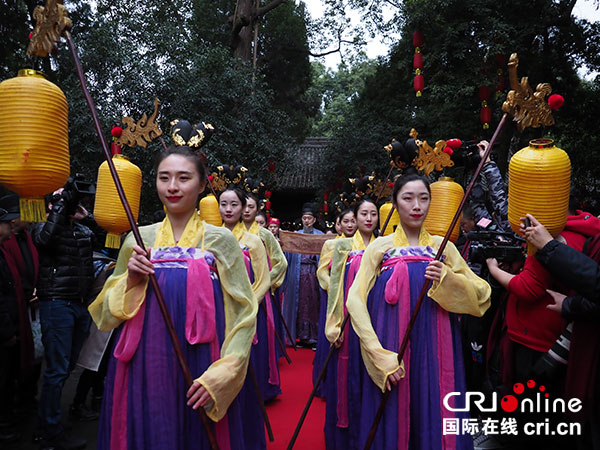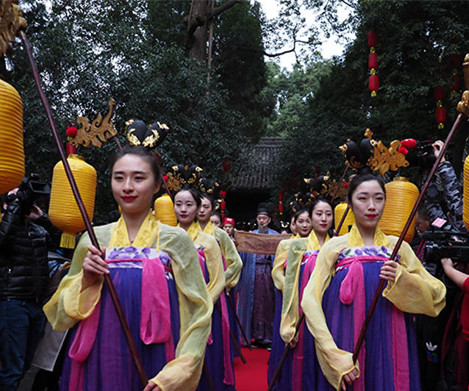Chengdu pays homage to poetry tradition on Human Day
- By Liu Sitong
 0 Comment(s)
0 Comment(s) Print
Print E-mail China.org.cn, February 27, 2018
E-mail China.org.cn, February 27, 2018
People from all walks of life gathered at the Du Fu Thatched Cottage, the former residence of great Chinese poet Du Fu, in Chengdu, Sichuan province, on Renri or Human Day, which fell on Feb. 22 this year, to celebrate the prolonged history of traditional poetry.
Experts from the province’s Du Fu research institute and poetry enthusiasts including primary and middle school students participated in the event in which an elegiac address was read, attendees recited Du Fu’s classic works with accompaniment of guqin, a seven-string musical instrument that has been part of the highbrow culture in China since Spring and Autumn Period (770- 476 BC).

According to Chinese legend, Human Day was the day when Goddess Nyuwa created human after creating the world and animals during the first six days. The tradition to celebrate Human Day on the seventh day of first lunar month each year originated in Han Dynasty (202 BC – AD 220).
In Chengdu, the ritual merged with another tradition of paying homage to Du Fu, the great patriotic poet known for his realistic works, in Qing Dynasty (1644 - 1911). What linked the two events was the poetic compositions exchanged between Du and his friend Gao Shi.
A prominent poet in Tang Dynasty (618-907), Du Fu (712-770) witnessed the An Lushan Rebellion that weakened the empire and relocated to Sichuan to escape the chaos caused by the war. In Chengdu, Du Fu made friends with another poet Gao Shi, who composed a poem on Human Day in 761 as a gift, which Du responded years after in memory of Gao who had deceased by the time.
The ritual of the dual celebration of Du Fu and Human Day waned in modern China. However,
starting from 1992, Chengdu resumed the tradition and has hosted the homage paying event for 26 years since.

Not only the local residents were attracted by the grand occasion annually, visitors from other cities also couldn’t resist the appeal. A visitor from Xi’an, capital of neighboring Shaanxi province, told the media that it was inspirational a traditional culture lover to see traditional poetry regain popularity.





Go to Forum >>0 Comment(s)